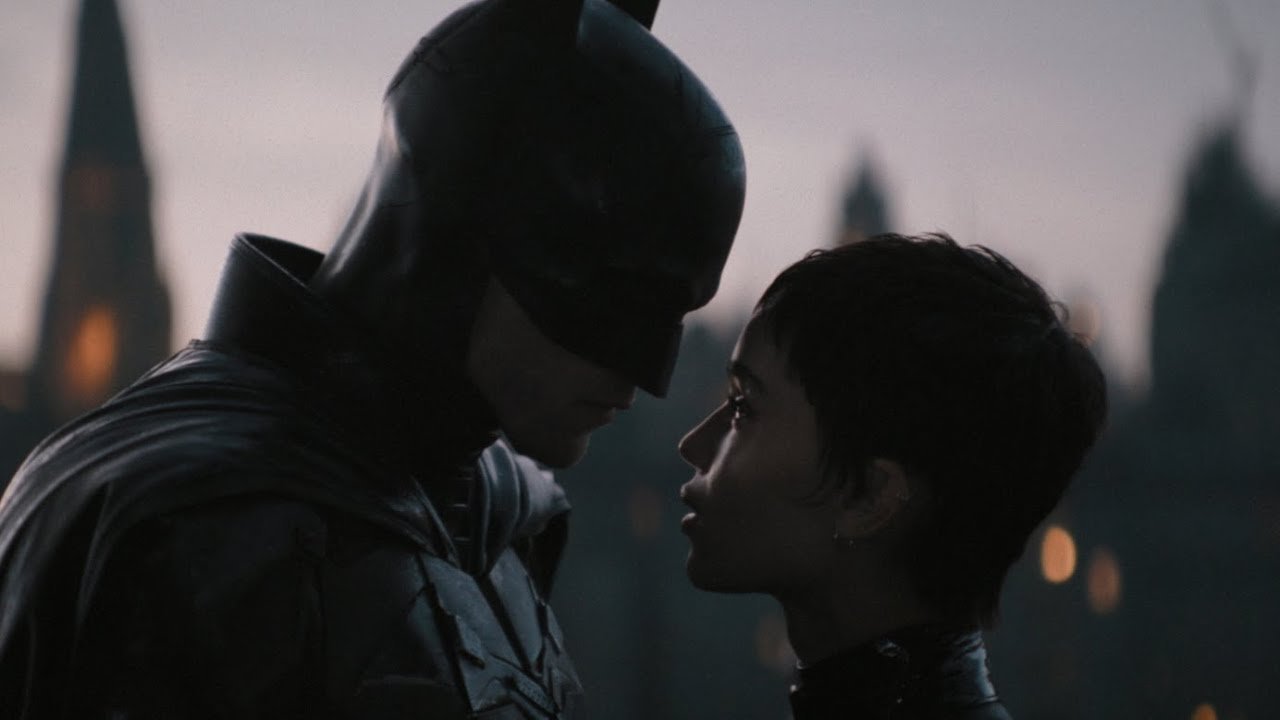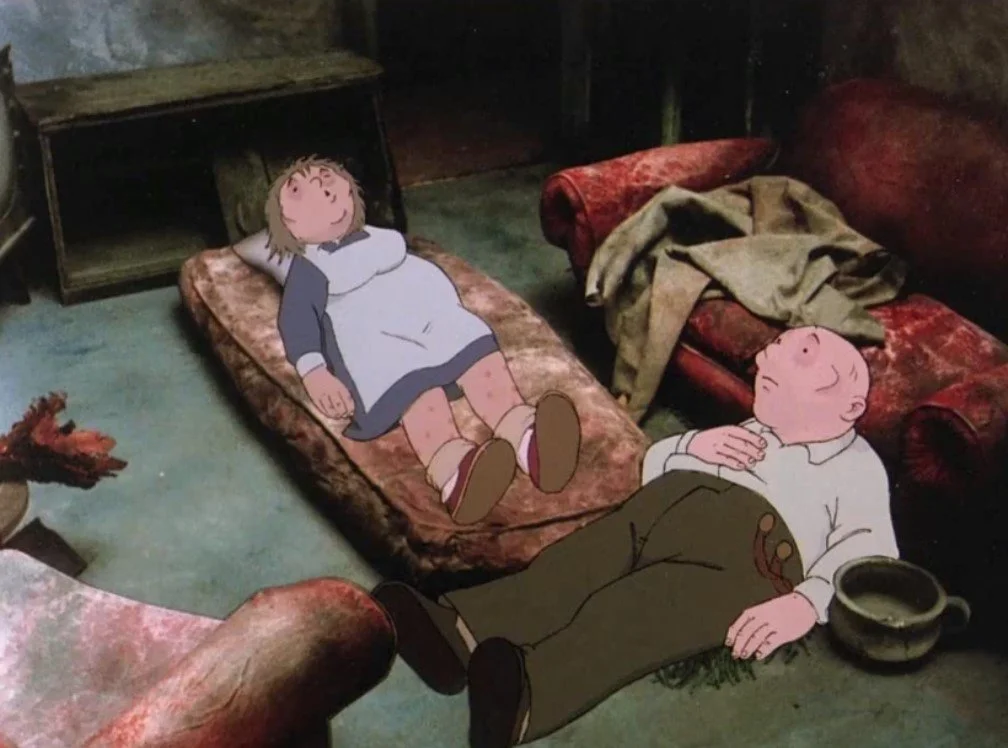The Batman (2022)
It’s Judgment time again, folks, and today, Vengeance himself is on trial. Remember, as always, we don’t do rating systems. This is because we’re such galaxy-brains that no quantifiable rating could ever contain our genius. Instead, we curate and distill our brilliant thoughts into opinions and recommendations contained in 1,000-word articles we call Judgments.
The Batman and Selena Kyle share a classic rooftop romance scene.
You might wonder what a Batman movie is doing on a horror blog. There’s a lot to be said about horror in the Batman franchise. As a matter of fact, that might be good fodder for a future Dissection, maybe as part of a series on superhero horror. Not today, and not here, though. For now, you’ll just have to take the next couple paragraphs as evidence enough that, in spite of his many comedic and actiony and kid-friendly incarnations, at his core, the Dark Knight is a hero rooted in horror and mystery.
To some extent, it’s obvious, right? Dude spends large chunks of his time in the Batcave, which is a literal bat cave. He does most of his crime fighting in the pitch of night, lurking in the shadows to pounce upon unsuspecting ne'er-do-wells with the goal of instilling fear, giving him an air of the supernatural. The Bat, though, is anything but supernatural. He’s the quintessential detective hero, relying on his wits and powers of observation to solve mysteries, and he’s the quintessential horror survivor/hero, who must subdue his own crippling fear and trauma to defeat monsters far more powerful than him who terrorize Gotham and haunt the cackling halls of Arkham Asylum—which, by the way, gets its name from the most well-known of HP Lovecraft’s settings: the town of Arkham. Horror enough?
The silly Batmans of Adam West and Michael Keaton, of LEGO and Robot Chicken—they’re good for a laugh, but they work that way because they’re parodies. The brooding and isolated Batman whose obsession with justice borders on insanity, the Batman ridden with guilt over the ultraviolent death of Robin at the Joker’s hands, the old man collecting his broken body for one last go at saving a city of perpetual doom and decay—that’s the real Batman. The Defender of Gotham. The World’s Greatest Detective. The Bat. And of course, the Dark Knight.
So, when the trailers for his latest iteration advertised a film centered on his horror and detective roots, we knew we had to see it, and we were not disappointed.
Well, okay, so we’re always a little disappointed, and we’ll talk about that too. But on the whole, The Batman is a refreshing reminder of what makes the Detective such an incredibly iconic, disturbing, and compelling hero.
The film opens with camerawork that skulks through the shadows of Gotham as Robert Pattinson, playing the role of the titular Bat, delivers brooding narration to match the film noir-style imagery, helping to set the story’s bleak, intense, and unrelenting tone. By the time we hear Nirvana’s “Something in the Way”—essentially The Batman’s theme song—and the Darth Vader-like death march that accompanies The Bat himself, we’re fully invested in this gothic/noir-type film with the grungiest of Batmen. And Pattinson's Bat, remarkably, embodies both the mystery and the horror of the film.
Living up to his moniker as the World’s Greatest Detective, this sharp, obsessive, and exceptionally observant Batman solves the riddles scribbled on greeting cards addressed to him by the Riddler, works through complicated ciphers with a very John Watson-like Alfred (Andy Serkis), and tracks down persons of interest with help from Jim Gordon (Jeffrey Wright), one of the few straight cops in town, and femme fatale Selina Kyle (Zoë Kravitz).
But, as we've mentioned, The Batman is also horror. At the start, we learn our lead has been lurking in the shadows and striking down criminals who parade through the city in the cover of night for two years now. And while he’s developed a working relationship with Jim Gordon, the rest of the very corrupt police force doesn’t trust him. They fear him. And it’s easy to see why. This version of The Bat is genuinely terrifying: dark, stony, uncomfortably quiet, intensely violent, and with a penetrating gaze that puts almost everyone around him on edge.
Even when the cowl comes off, our protagonist appears ghoulish, especially with the smeared black makeup he wears underneath. His hair spills over his pale face like wet string. His head stoops down with his shoulders in a perpetual slouch. Add on the death march leitmotif (that’s fancy talk for a tune that plays repeatedly throughout a film or play, in this case, to signal the sinister presence of the Batman), and you have horror personified in a heavily armored vigilante calling himself Vengeance.
Robert Pattinson’s Batman rarely breaks character to become Bruce Wayne. When he removes his mask, he often leaves his eye makeup on, making him appear ghoulish and horrific.
It’s notable that we never really meet Bruce Wayne in this one. At least, not the public-facing Bruce Wayne who's so often seen as a billionaire philanthropist, playboy, and socialite. There’s a moment of teasing, in which Alfred asks his young master if Bruce is going to grace us with his presence, but even mask-less, he remains the Batman. Intense. Screaming in his wounded and furious silence. Self-destructive. And (almost) unflappable.
But flap he does. In fact, his moments of flapping in the face of fear are part of what make his arc so incredibly satisfying. Unlike many superhero movies these days, in which a hero takes a pratfall as a joke and nothing more, we see this Batman fall—and fall hard—on two occasions. One of them fits into pratfall territory, but it makes a crack in this terrifying sentinel of a figure, lending him surprising depth of character, as we glimpse not only the man behind the mask of the Dark Knight, but also the frightened orphan behind the Prince of Gotham.
But in spite of so much excellent work on the Batman himself—maybe even because of that work—the film ends up tonally imbalanced. For a story so oppressively dark, it has a fair amount of humor to help release the tension, but other moments that we found funny seemed like they weren’t actually supposed to be.
Let us explain by way of comparison. Remember season one of True Detective? How it's all dark and broody, and Matthew McConaughey's a nihilist, and Woody Harrelson plays his foil, as a down-to-Earth, no-silly-stuff everyday Joe? See, we loved that season. But every time we talked to our friends about the humor, often mentioning McConaughey’s absurdly pitch black tone and Harrelson’s spot-on but simultaneously asinine reactions and criticisms, our friends would look at us like we were psychopaths.
Same thing here. The movie has that pitch-black tone that goes so far it becomes funny, but it might not be meant that way. It could be that we’re just psychopaths, and none of this time-is-a-flat-circle stuff is funny at all. Regardless, the tone of the film gets kind of wobbly.
Our other criticism is another one that’s really up for debate. We have loved Paul Dano ever since Little Miss Sunshine, and we think he does a fine job playing this character. But we’re just not sold on this iteration of the Riddler as a QAnon-like figure. Maybe we’re just holding on too much to the campy versions of the Riddler—especially Jim Carey’s take on the role—but if Dano’s Riddler would’ve had a touch more silliness, he might have served as a useful foil to the Batman’s broody nihilism.
And, of course, there’s a completely unnecessary car chase that adds nothing of value to the story and takes much too long to conclude.
Overall, though, we’re excited to see classic horror/mystery Batman finally make his way to the big screen. This grim, gothy, gritty version of the World’s Greatest Detective is a beacon of hope for the future of DC superhero movies.








